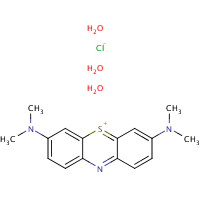Methylene blue trihydrate
Agent Name
Methylene blue trihydrate
CAS Number
7220-79-3
Formula
C16-H18-N3-S.Cl.3H2-O
Major Category
Dyes

Synonyms
Methylene Blue trihydrate; Methylene blue [USP]; 3,7-Bis(dimethylamino)phenothiazin-5-ium chloride trihydrate; C.I. Basic Blue 9 trihydrate; Methylene Blue; C.I. Basic Blue 9, trihydrate (8CI); Phenothiazin-5-ium, 3,7-bis(dimethylamino)-, chloride, trihydrate; [ChemIDplus] 3,7-Bis(dimethylamino)phenazathionium chloride trihydrate; 3,7-Bis(dimethylamino)phenothiazin-5-ium, chloride, trihydrate; Methylthionine chloride trihydrate; Tetramethylene blue trihydrate; Tetramethylthionine chloride trihydrate; [CAMEO] MBLU; [NTP]
Category
Azine Dyes
Description
Dark green odorless solid with a bronze luster; [Merck Index] Hygroscopic; [CAMEO] Dark green powder; [Sigma-Aldrich MSDS]
Sources/Uses
Used as a bacteriological stain, redox colorimetric agent, and in medicine (antimethemoglobinic); [Merck Index] Used to dye cotton and wool; [NTP]
Comments
A skin and severe eye irritant; Toxic by ingestion (nausea, vomiting, diarrhea, dysuria, and hemolytic anemia from large doses); Repeated-dose oral studies of rats and mice demonstrated methemoglobinemia and a regenerative Heinz body anemia with secondary organ injury; Some evidence of carcinogenicity in male rats and mice, equivocal evidence in female mice, and no evidence in female rats; [NTP] A skin and strong eye irritant; Harmful by ingestion; Targets the blood, CNS, and eyes; May induce methemoglobinemia; [Sigma-Aldrich MSDS] See "Methylene blue."
Biomedical References
Adverse Effects
Methemoglobinemia
MetHgb is secondary toxic effect
Diseases, Processes, and Activities Linked to This Agent
Processes
Industrial Processes with risk of exposure: